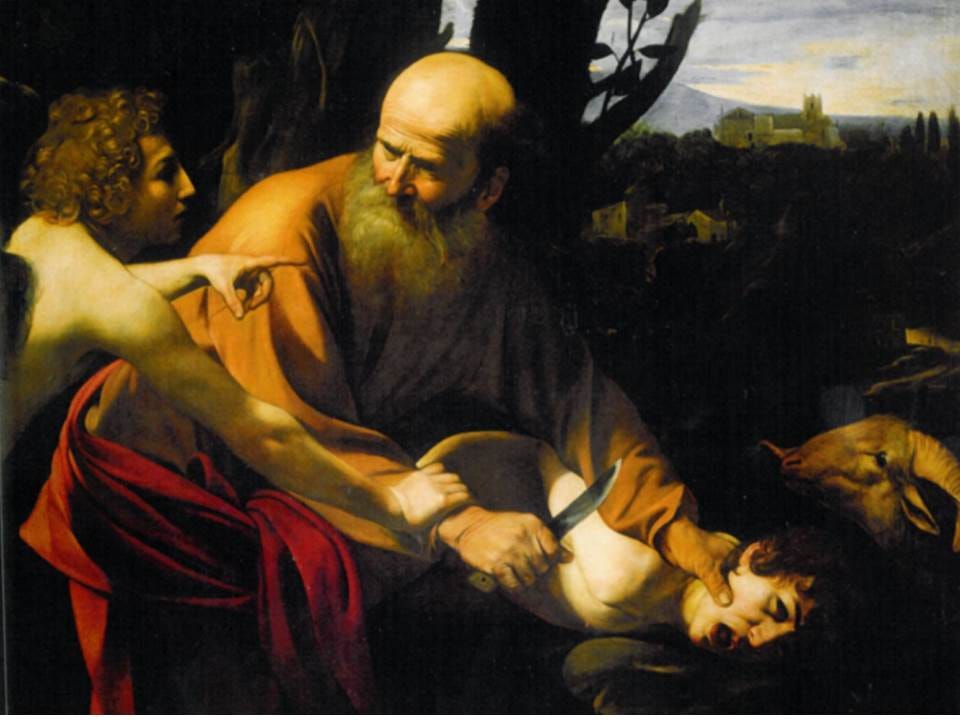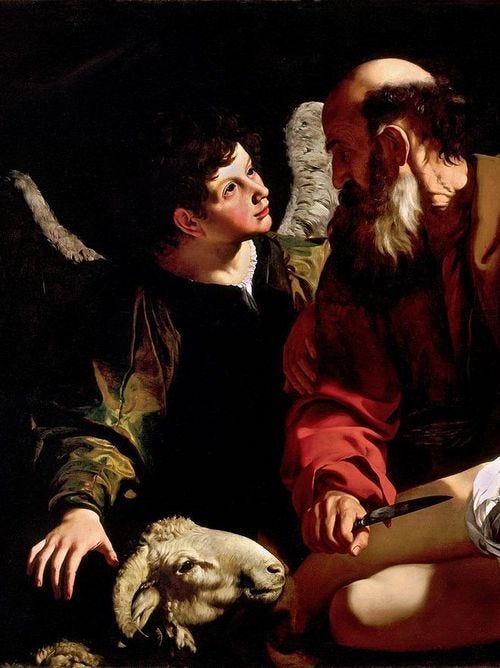Job Chapter 17
Child Sacrifice - Don't Do It
“He has rendered me a proverb, and men treat my face like a Tophet” - Job 17:6
In most translations, v'tofet is translated as spit. As in “they spit in my face,” but Tophet is more than spit. Tophet is a place of evil, garbage and shit. When King Josiah set out to reform Isarel, he defiled Tophet in the Valley of Ben-Hinnon. He tore down the alters and rendered the valley a garbage dump.
Tophet is a place where people practiced child sacrifice.
Modern readers may want to dismiss the interpretation. Ancients from Socrates to Plutarch to Diodorus Siculus accused other cultures of child sacrifice. Modern rhetoric idealizes children. Forced birthers define barely formed fetuses as babies. The New York Post loves to publish stories of dead children and their poor trash parents. Qanon believers see child molesters everywhere besides the trusted family friend with all the red flags.
Yet, archaeological evidence finds evidence of child sacrifice in Peru, Mexico, North Africa and Israel. In former Carthage archaeologists found hills full of child corpses. An excavation at Basur Hoyuk found child sacrifices from the height of the Bronze Age (3100-2800 BCE). In Greek legends, Agamemnon sacrifice his daughter to bring back the winds and lead his armies to Troy.
Then we have the Biblical depictions of human sacrifice, suggesting that it's written in the context of a society that is fighting against the practice. The prophets condemn it. The legal system forbids it. King Josiah destroyed the Tophet. Solomon's wisdom comes from an anecdote where he gives a baby to the woman who doesn't want to cut it in half. That story might be allegorical, but it still features a woman in a custody battle, who says “yes, please kill the baby.” Jepthah pledges to sacrifice the first thing he sees upon returning from battle. When he sees his daughter, he could sacrifice her dress or her hair or timbrels. He sacrifices her. There's no moral. The book moves on to the next Judge.
The laws against sacrifice should be proof enough. You don't legislate against actions that people don't want to do. There are no kosher laws forbidding cannibalism or poop. Cannibalism shows up in the Bible, but always to horrify the reader. By contrast, the Bible constantly tells the reader not to sacrifice their children, as if that's an option.
Even more prominent are the attempts to assimilate child sacrifice. First born children are redeemed with money. The Temple instituted animal sacrifice. Even in the first century CE, the desire for child sacrifice was so widespread that a Jewish sect believed that their founder was the only child of G-d and that G-d sacrificed him to atone for everyone's sins.
Then there's Abraham and Isaac. The story of Abraham binding Isaac has haunted me since I first heard it as an 11 or 12 year old kid. The Bible study leader told the story as if it was a good thing and condemned those who had failed to kill their children. This was the same Bible study session with faith healing, speaking in tongues and a woman asking me if I had done something with a baseball bat (she had a vision). Other Christians would present the story with discomfort but that first enthusiastic telling stuck with me.
The Bible is not a book full of easy answers and children stories. Like all great art, the Bible presents more questions than it answers. Consider the context of the Akedah. Before G-d tells Abraham to take Isaac as a sacrifice, G-d tells Abraham that he's going to destroy Sodom and Gomorrah. Abraham doesn't argue on behalf of his cousin Lot. He argues on behalf of the possibly 50 righteous citizens who would die along with the wicked. Then he gets G-d down to 40 and 30 and finally 10. Abraham wheedles G-d into sparing Sodom on behalf of ten innocents.
Then after G-d destroys Sodom (sparing Lot and daughters who would found the Moabites and Ammonites), G-d tells Abraham to listen to Sarah when she exiles Hagar and Ishmael. He assures Abraham that Ishmael will be fine. In fact, Ishmael will found a great nation.
Abraham is so eager to fight on behalf of strangers and his spare son. Yet, when G-d tells him to offer up Isaac as a human sacrifice, Abraham is silent. Even when Isaac asks about the sacrifice, Abraham lies by omission with “G-d will provide.” Only when they get to the mountain and Abraham has tied up Isaac does G-d intervene with a sacrificial ram. He was ordered to present Isaac as a sacrifice. He wasn't ordered to complete the act.
Happy ending?
Isaac and Abraham walk to the mountain together. They walk away separately. They never talk again. Sarah dies in the next chapter. A midrash claims that she died of grief when she heard about the sacrifice. Abraham orders his servant to find Isaac a wife and then goes off to make more tribes to harass and oppress the children of Israel.
Rav Kook declared that the point of the story was that child sacrifice is bad. The Bible makes this argument repeatedly. No one should purposefully sacrifice their children on the alter of G-d. Yet, so many faithful zealots enthusiastically sacrifice children. How many “orphans” are marching in Pride parades, having chosen their mental health over their families? How many killed themselves before they could be themselves? In the current war, Hamas operatives use children as human shields in hopes of a stray bomb or bullet turning a child into a propaganda poster. Sinwar isn't even hiding this strategy. Jim Jones followers made their children drink the cyanide laced Kool Aid first.
Two poems.
The Actions of the Fathers
T. CarmiAnd after the Akedah?
Then the most difficult test began.Abraham took his son to the camel races
Hiked with him from the Euphrates to the Nile,
Swam by his side, watching him like a hawk
In the waters of Eilat. And when they returned home,
He slaughtered flocks and herds aplenty,
All tender and good,
Sweet scent of songs and of muscle and meat
And guests in good graces come in from afar.
Isaac ate and ate, ate –
And was silent.Abraham bought his wife a fur coat
And golden jewelry
He installed emergency lighting in their tent
He brought her boots in style from a shop on the Nile
Hashish from Tarshish,
Cinnamon from Lebanon.
Sarah, who grew old overnight,
Never took off her mourning clothes.Abraham prayed to his God morning and evening,
He hung tzedakah boxes on all the tamarisk trees,
Studied his Torah night and day,
Fasted,
And gave room and board to angels for almost no fee.
The voice from on high disappeared.And the voice within him
(The only one left)
Said: Yes, you went
From your land, from your homeland, the land of your father,
And now, in the end, from yourself.
Abraham
Meir WieseltierThe only thing in the world that Abraham loved was God.
He did not love the gods of other men,
Which were made of wood or clay and of polished vermilion,
Which were created by men who came home each evening to their wives
to guzzle meat and wine,
Which were sold in the city market like onions to the highest bidder:
He invented his own God, and made himself His chosen one.And of everything that existed in the world, he loved only Him – God.
He did not bow down to other gods; he said to them: If you go right,
I’ll go left; If you go left, I’ll go right
He said: Lest they say, I made him wealthy.
He refused to take anything from anyone or to give anyone anything,
Except God. Him, all He had to do was ask,
And He would receive. Everything. Even Isaac, the only one, the tender inheritor.
(But if there is a God, there is also an angel.)He did not appreciate anything in the world, only God.
He never sinned to Him; there was no difference between them.
Not like Isaac, who loved his coarse-minded son; not like Jacob
Who slaved away for women, who limped from the blows that God gave him at night,
Who saw angelic ladders only in dreams.
Not so Abraham, who loved God, and whom God loved,
And together they counted the righteous of the city before they wiped it out.
Job is not Abraham. Abraham is eager to sacrifice his first born son. Job's children dies and Job is distraught. Abraham is a founder, a true believer, the progenitor of monotheism. Job is a poor schmuck. Abraham never doubts G-d. Job rages against G-d and the unfairness of the universe. Job asks questions and makes complaints that would shock Abraham. He certainly horrifies his friends.
Job's reference to child sacrifice is a great evil. Abraham almost sacrifices Isaac and then goes on with his life. Job weeps. Abraham aspires to great deeds. Job cries out. Abraham is the patriarch of patriarchs. Job is a human being.
If you want to read more Meir Wieseltier poems, here’s his book in translation
For more Bible stories, here is She Nailed a Stake Through His Head







This is the best of what I have on hand. I hope this helps you understand God's message.
TOPHETH (תֹּפֶת, topheth). A site in the Valley of Hinnom just outside of Jerusalem. Associated with child sacrifices to the deity Molech.
Etymology
The etymology of the name Topheth is uncertain. Smith suggests that the Hebrew place name is of Aramaic origin and aligns with the word for “fireplace” (תְּפָיָא, tephaya'; Smith, The Religion of the Semites, 378n2. This interpretation has gained the widest following, though the exact origin of the term remains contested. For example, Day traces the Hebrew term to the word for “bake” (אפה, 'ph; Day, Molech, 26–28). The link between the Valley of Hinnom (גֵּי הִנֹּם, gey hinnom) and Gehenna is suggestive of the site’s fiery association (Matt 18:9).
Location
Biblical texts situate Topheth in the Valley of Hinnom (2 Kgs 23:10; Jer 7:31; 19:6). However, the precise location of the site is difficult to determine. The Valley of Hinnom is often associated with the Wadi er-Rababeh, which is southwest of the old city of Jerusalem and runs eastward toward the Kidron Valley. Another possible location is the Tyropoeon Valley (Simmons, Geographical and Topographical Texts, 13–14; Heider, The Cult of Molek, 351–52; Dearman, “The Tophet in Jerusalem,” 64).
Biblical Relevance
Second Kings and Jeremiah mention Topheth as the place where children were “made to pass through fire” or “burned in the fire” as an offering to Molech (2 Kgs 23:10; Jer 7:31–32; 19:6, 11–14). According to 2 Kings 23:10, King Josiah “defiled” this site as part of his religious reforms. Jeremiah 7:31 refers to Topheth as a “high place” (בָּמָה, bamah), a term used in the Old Testament to characterize heterodox practices and places of worship (Jer 19:5; 32:35; for a discussion on the possible connection of the cult to Baal, see Day, Molech, 34–40; Dearman, “The Tophet in Jerusalem,” 66–68). Leviticus forbids the “giving” of one’s offspring to Molech (Lev 18:21; 20:2–5).
Other passages do not explicitly mention Topheth or Molech but contain similar formulaic phrases describing the burning of children. For example, the Judaean kings Ahaz and Manasseh are critiqued for making a son “pass through fire” (2 Kgs 16:3; 21:6)—the exact practice associated with Topheth in 2 Kgs 23:10 (see also Deut 12:31; 18:10; 2 Kgs 16:3; 17:17; 21:6; Ezek 20:31). The function and description of Topheth may be clarified by Isa 30:33, where a similar noun occurs: “burning place” (תָּפְתֶּה, tophteh). In this passage, Isaiah describes a fire pit that awaits the Assyrian king: “its pyre made deep and wide, with fire and wood in abundance; the breath of the Lord, like a stream of sulfur, kindles it” (NRSV).
Scholars disagree whether the biblical texts imply child sacrifice was actually carried out in Judaea at Tophet. Weinfeld argues that the Old Testament passages are figurative, not literal, and that a child was merely dedicated to the deity, not sacrificed (“The Worship of Molech and of the Queen of Heaven,” 140–54). However, other scholars point to polemical biblical texts and signs of the practice in neighboring regions to maintain that some Judaeans may have participated in the rite of sacrifice (Heider, The Cult of Molek, 406–8; Smith, “A Note on Burning Babies”; Day, Molech).
Extrabiblical Evidence
Archaeological and inscriptional evidence stemming from Phoenician burial sites, particularly the one discovered at Carthage, have frequently been compared with biblical texts. Charred remains of children and animals buried in urns at the “Tophet” in Carthage (named after the Jerusalem Tophet) date approximately from the eighth to the second centuries BC. Scholarly opinions of these findings vary. For example, Stager and Wolff suggest that animal bones found near human remains are the likely result of sacrifice, as are associated inscriptions that allude to the fulfillment of a vow made to a deity (Stager and Wolff, “Child Sacrifice at Carthage“; Stager, “Carthage”). Day draws on classical literary sources that affirm child sacrifice as a Phoenician and Carthaginian practice (Day, Molech, 87–91). Benicho-Safar represents an alternative perspective, arguing that the remains of children are the result of death by natural causes (Benicho-Safar, “À propos des ossements humains du tophet de Carthage,” 5–9).
The diverse interpretations of the texts and material remains at Topheth raise questions about the precise nature of Topheth rituals—particularly whether they always involved sacrifice or may have involved cremation as a burial practice. Dearman argues that a range of rituals was likely involved at these sites (Dearman, “The Tophet in Jerusalem”).
Sara Wells, “Topheth,” ed. John D. Barry et al., The Lexham Bible Dictionary (Bellingham, WA: Lexham Press, 2016).